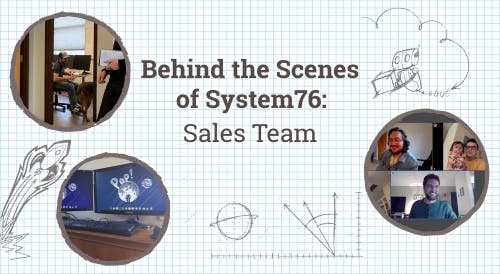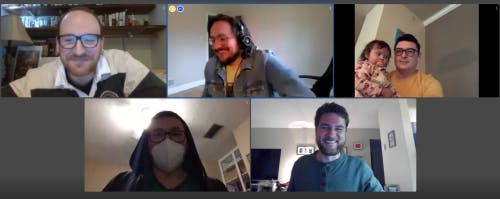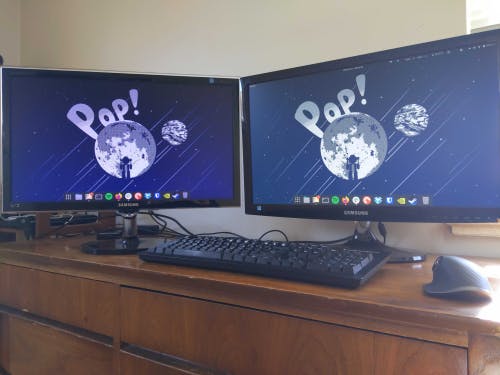Behind the Scenes of System76: Sales Team

The System76 Behind the Scenes series aims to give readers an inside look at the people behind our mission. This week, we spoke with VP of Sales Sam Mondlick about the challenges of conducting business during a pandemic, and how long it’ll take the Sales Team to make a certain blog author a millionaire.
You know. The important things.
Take a moment to describe the different functions of the Sales Team.
The Sales Team itself is currently made up of two different positions. The Customer Experience Specialist (CES) is the first line of conversation with System76 with regards to anything order-related. Their job is to make your process from purchase to shipment as easy as possible and provide you with as much information as you might need, such as giving status updates about orders or answering questions that may have arisen.
The other position within Sales is Account Management. They’re the people you talk to from first inquiry to System76 about products. These guys help anyone, from my 80-year-old grandma who’s looking to transition from Windows to Linux, to Fortune 50 companies. They deal with a wide variety of customer base, so they’re pretty much experts in getting the customer what they need.
Then there’s the Product Management side of Sales. The Product Manager stays up to date on all-new technology, and then informs and directs the team. The position was built to ensure System76 is at the forefront of new and exciting technologies, whether that’s within the Thelio product line or in the form of updates that come to our laptops. And that could be as simple as tracking memory updates from DDR4 to DDR5, or with PCIe 3.0 updating to PCIe 4.0. For things like that we’ll track and update products throughout their lifetime.
What is the guiding principle for how the System76 Sales Team operates?
The Sales Team philosophy we push is what I call, “Consultative Sales.” We’re here to be an assistant to the user in order to get them the right product for the job; we’re not going to upgrade you for the sake of upgrading. The team is there to understand what you want to accomplish so that they can get you the right machine with the optimal performance for your use case.
What factors into the decision to introduce a new product?
There’s quite a few factors internally that we’ll go through. Looking at our product line we ask ourselves, is there something that’s missing from it? And if we do find something, what are the benefits to it? How is it going to make us as a company better, and us as a provider of Linux-based technologies the right fit for our customers?
For the Lemur Pro, battery life had always been a high-value item for our customer base. Before the Lemur Pro and Darter Pro were introduced about 2 years ago, the average battery life on a System76 computer was about 3-5 hours. The ability to introduce a product with a higher battery wattage allowed us to extend battery life almost threefold. That value is really what drives a product forward.
What is your team’s background with Linux?
A lot of the team members have a background in Linux as users. That’s what we tend to typically hire and bring on. They are apt in review and understanding, and helping customers that have specific tasks and needs within the Linux environment. Charles was using Raspberry Pis in order to do some cool things, and Bradley used Ubuntu even before he was hired. The same can be said for Jeremy and John. They all believe that Linux is the right tool for people, and they showcase that for incoming customers. Even if they’re not tech-savvy within Linux, there’s a background there with using it and seeing it in the wild.

What challenges did the pandemic present when it first started?
I think at the very beginning, the biggest challenge for us was the loss of the team camaraderie. A lot of Sales is personal relationships, and the team feeds off of each other, so having everyone in the same area was a huge benefit pre-pandemic.
In the first month or so after it started, there were definitely challenges with productivity and communication because Sales works a lot with Engineering, Support, and other departments in order to give the customers the information they need to make an educated decision, or to update them on the status of their order.
But, I think one of the best tools we have is our employee messaging client. That was already ingrained in us as something that was used pre-pandemic that really started to show its value post-pandemic, especially with the team members being in different homes—and in some cases, different states. It allowed us to provide our staff with as much as they needed to make their environment feel like they were still in an office, still able to get the camaraderie, and still able to get almost the same instantaneous response as they would in the office, but now done remote.
Our ability to put tech first, especially within Sales and Service, is one of the things we do really well. We never throw people at a problem. By that I mean we don’t delegate a problem up the chain to solve it. Instead we work for a solution, and our people evolve into that solution. From my viewpoint, we’ve established that a remote environment is as productive as an in-person environment, which has opened up the door for System76 to grow. Instead of working within a local pool, we’ve now moved to the ocean. Whereas you used to have to hire and work to provide resources for new hires to move to Denver so they can work with the team, now we can bring on team members from pretty much anywhere on the globe to come help make System76 better.
System76 has seen steady growth in the past year despite drastic political and economic changes. What do you attribute the success to?
I think we’ve matured as an organization. We have introduced products and product lines that are meeting and exceeding a lot of different customer requirements. When I look at our desktop line from when I started seven years ago, our options were the Ratel, the Wild Dog, the Leopard, and the Sable. With production moving in-house and the introduction of Thelio in the last two and a half years, keeping in mind both Intel and AMD, we’ve gone from offering a four-desktop solution to nine.
Laptop and desktop quality has also increased in the last seven years, and a lot of that has to do with what we’ve done in our new manufacturing facility. We have made leaps and bounds with regards to what we’re doing with software engineering now. There’s a huge demand for what our Software Engineering Team has done, driven by Jeremy and our open firmware/open EC that speak to a lot of people. Companies are looking at an open source solution instead of proprietary because they want more control over what their team and their organization are doing.
One of the things we’ve noticed is that our business clients have grown. There’s significantly more support and drive from both the end user and the corporate side to make it so Linux is a valued and desired solution for their teams. Today, I can probably put a Windows 10 machine next to my Pop!_OS 20.10 machine and accomplish everything in the same amount of time or faster. Maybe I’m not using the same applications, but anything I as a businessperson could do within Windows, I can now do with Pop!_OS or Ubuntu. The Linux ecosystem is continuously changing, and that only helps us as a company.
You’ve been at System76 for quite a while. What’s it been like watching the company grow?
It’s amazing. When I started at the company, I was really the first Sales-oriented person. I was the 8th employee at the time, and now I’m the 5th-oldest employee of System76 out of over 50 employees. So it’s huge, man.
When you look at a lot of big corporations, change is hard to make happen. It’s looked at as too different, too risky. But here, change is really something we strive for. We work to be different, to be new, to figure out new ways to help our customers or create solutions to help them, or figure out ways that can change us for the better that you just typically wouldn’t see from a corporation.
What was your favorite moment?

When I first looked at System76, back when we were only offering Ubuntu, I saw the beginning of something very similar to another major player. Very grassroots, very much specialized and hardware-specific. They also created their own operating system, so when I interviewed in 2014, I made comments during my interview with Carl that I expected us to probably produce our own operating system as well. I thought that would be our endgame as a company. At that time, and Carl might contradict my memory on this, but I remember he didn’t think that would ever happen. And then in October 2017, we released the first version of Pop!_OS. That made everything come kind of full-circle for me.
The following year, we brought hardware inside in order to make it the best that we could. So in three short years from me starting, we took what we were doing and elevating it to something that only a handful of companies do, and do well. Our potential is really limitless from what I’ve seen so far, and it’s very apparent with what we’ve done with Pop!_OS since its release, as well as where we’ve taken Thelio. I bet you we never thought we would’ve implemented something like i3 tiling into Pop!_OS. I really goes back to how we view change. We embrace it. We see it as trying to do something better than we did before. Carl and the Engineering Team view software as always being about revision, and we bring that philosophy back to hardware and back to the company as a whole.
Like what you see?
Share on Social Media